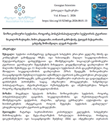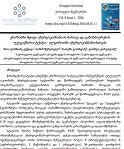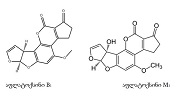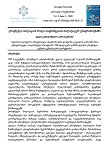Artificial Intelligence and Medicine

Downloads
Artificial intelligence (AI) is increasingly integrated into medical sciences, aiding in disease diagnosis, drug discovery, and improving patient care. Notably, AI has proven crucial during public health crises like the COVID-19 pandemic, enhancing disease prediction and management. Technologies such as machine learning and neural networks offer more accurate, personalized treatments in fields like radiology, cardiology, and oncology. The growing use of FDA-approved AI-powered medical devices highlights its rapid adoption. Looking ahead, AI promises to enhance healthcare quality, improve treatment accuracy, and support early disease diagnosis, ultimately contributing to better health outcomes and longevity.
Downloads
ხელოვნური ინტელექტით აღჭურვილი სისტემა საშვილოსნოს ყელისა და სარძევე ჯირკვლის სიმსივნეების დიაგნოსტირებისათვის. სტუ-ის შრომები – Works of GTU ISSN 1512-0996 №2 (528), 2023
Geéron A. Hands-On Machine Learning with Scikit-Learn & Tensor Flow. 1st ed. Sebastopol, CA, USA: O'Reilly; 2017.
First Tests | Mastering the Game | Computer History Museum. Www.computerhistory.org. https://www.computerhistory.org/chess/first-tests/
Ridley DB. Priorities for the priority review voucher. Am J Trop Med Hyg. 2017;96:14–5. doi: 10.4269/ajtmh.16-0600.
Laura Craft. Emerging Applications of Ai for Healthcare Providers GARTNER. 2017. [Last accessed on 2019 Jun 24]. Available from: https://wwwgartnercom/en/documents/3753763/emerging-applications-of-ai-for-healthcare-providers
Dilsizian S, Siegel E. Artificial intelligence in medicine and cardiac imaging: Harnessing big data and advanced computing to provide personalized medical diagnosis and treatment. Curr Cardiol Rep. 2014;16:2014. doi: 10.1007/s11886-013-0441-8.
Health, C. for D. and R. (2021). Artificial Intelligence and Machine Learning (AI/ML)-Enabled Medical Devices. FDA. https://www.fda.gov/medical-devices/software-medical-device-samd/artificial-intelligence-and-machine-learning-aiml-enabled-medical-devices
Filippi M, Cecchetti G, Spinelli EG, Vezzulli P, Falini A, Agosta F. Amyloid-related imaging abnormalities and beta-amyloidtargeting antibodies: A systematic review. JAMA Neurol. 2022; 79:291-304
Davoudi A, Malhotra KR, Shickel B, Siegel S, Williams S, Ruppert M, et al. Intelligent ICU for autonomous patient monitoring using pervasive sensing and deep learning. Sci Rep. 2019;9:8020. https://doi.org/10.1038/s41598-019-44004-w.
Ellsworth MA, Lang TR, Pickering BW, Herasevich V. Clinical data needs in the neonatal intensive care unit electronic medical record. BMC Med Inform Decis Mak. 2014;14:92.
Chioma, R., Sbordone, A., Patti, M. L., Perri, A., Vento, G., & Nobile, S. (2023). Applications of Artificial Intelligence in Neonatology. Applied Sciences, 13(5), 3211. https://doi.org/10.3390/app13053211
Copyright (c) 2025 Georgian Scientists

This work is licensed under a Creative Commons Attribution-NonCommercial-NoDerivatives 4.0 International License.

























































































































































































































